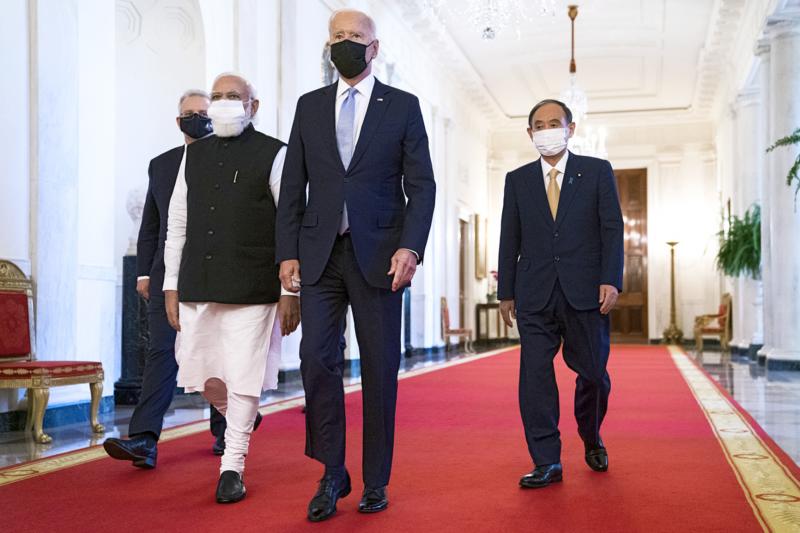India, Australia, Japan and the US are today to start the second phase of this year’s Malabar naval exercise in the Bay of Bengal, the Indian Navy said yesterday.
They are to be the first military exercises held by the Quadrilateral Security Dialogue (Quad) since Australia, the UK and the US announced their AUKUS pact on Sept. 15, under which London and Washington are to help Canberra obtain nuclear-powered submarines.
The three-day exercise is the 25th edition of the Malabar games, which began in 1992 as a bilateral exercise between India and the US, and have since grown to become a hallmark of Quad naval interoperability.

Photo: AP
The games have been held annually since 2002, with Australia and Japan joining for the first time in 2007. Japan became a permanent member in 2015 followed by Australia last year.
Phase 1 of this year’s exercise, hosted by the US, was held from Aug. 26 to Aug. 29 in the Philippine Sea off Guam.
The second phase intends to “build upon the synergy, coordination and interoperability developed during the first phase of the exercise and would focus on advanced surface and anti-submarine warfare,” the Indian Express quoted the Indian Navy as saying.
India is to send the Rajput-class destroyer INS Ranvijay, Shivalik-class frigate INS Satpura, P8I long-range maritime patrol aircraft and a submarine, the newspaper reported.
The US is to be represented by the USS Carl Vinson aircraft carrier and destroyers USS Lake Champlain and USS Stockdale, it said.
The Japan Maritime Self-Defense Force is to send its Izumo-class helicopter carrier JS Kaga and guided missile destroyer JS Murasame, while the Royal Australian Navy is to be represented by the Anzac-class frigate HMAS Ballarat and replenishment vessel HMAS Sirius, it added.

A fugitive in a suspected cosmetic surgery fraud case today returned to Taiwan from Canada, after being wanted for six years. Internet celebrity Su Chen-tuan (蘇陳端), known as Lady Nai Nai (貴婦奈奈), and her former boyfriend, plastic surgeon Paul Huang (黃博健), allegedly defrauded clients and friends of about NT$1 billion (US$30.66 million). Su was put on a wanted list in 2019 when she lived in Toronto, Canada, after failing to respond to subpoenas and arrest warrants from the Taipei District Prosecutors’ Office. Su arrived at Taiwan Taoyuan International Airport at 5am today on an EVA Air flight accompanied by a

An essay competition jointly organized by a local writing society and a publisher affiliated with the Chinese Communist Party (CCP) might have contravened the Act Governing Relations Between the People of the Taiwan Area and the Mainland Area (臺灣地區與大陸地區人民關係條例), the Mainland Affairs Council (MAC) said on Thursday. “In this case, the partner organization is clearly an agency under the CCP’s Fujian Provincial Committee,” MAC Deputy Minister and spokesperson Liang Wen-chieh (梁文傑) said at a news briefing in Taipei. “It also involves bringing Taiwanese students to China with all-expenses-paid arrangements to attend award ceremonies and camps,” Liang said. Those two “characteristics” are typically sufficient

A magnitude 5.9 earthquake that struck about 33km off the coast of Hualien City was the "main shock" in a series of quakes in the area, with aftershocks expected over the next three days, the Central Weather Administration (CWA) said yesterday. Prior to the magnitude 5.9 quake shaking most of Taiwan at 6:53pm yesterday, six other earthquakes stronger than a magnitude of 4, starting with a magnitude 5.5 quake at 6:09pm, occurred in the area. CWA Seismological Center Director Wu Chien-fu (吳健富) confirmed that the quakes were all part of the same series and that the magnitude 5.5 temblor was

Restarting the No. 2 reactor at the Ma-anshan Nuclear Power Plant would take up to 18 months, Minister of Economic Affairs J.W. Kuo (郭智輝) said today. Kuo was answering questions during a meeting of the Legislative Yuan’s Economics Committee, where legislators are considering amendments to the Renewable Energy Development Act (再生能源發展條) amid concerns about the consequences of the Pingtung County reactor’s decommissioning scheduled for May 17. Its decommissioning is to mark the end of Taiwan’s nuclear power production. However, Chinese Nationalist Party (KMT) lawmakers have proposed an amendment to the Nuclear Reactor Facilities Regulation Act (核子反應器設施管制法) that would extend the life of existing